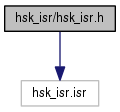|
hsk_libs-dev
163:b63ae088cc97
High Speed Karlsruhe XC878 library collection
|
|
hsk_libs-dev
163:b63ae088cc97
High Speed Karlsruhe XC878 library collection
|
HSK Shared Interrupt Service Routine headers. More...
#include "hsk_isr.isr"

Go to the source code of this file.
Data Structures | |
| struct | hsk_isr5_callback |
| Shared interrupt 5 routine. More... | |
| struct | hsk_isr6_callback |
| Shared interrupt 6 routine. More... | |
| struct | hsk_isr8_callback |
| Shared interrupt 8 routine. More... | |
| struct | hsk_isr9_callback |
| Shared interrupt 9 routine. More... | |
| struct | hsk_isr14_callback |
| Shared non-maskable interrupt routine. More... | |
Variables | |
| struct hsk_isr5_callback | hsk_isr5 |
| Introduce callback function pointers for ISR 5. More... | |
| struct hsk_isr6_callback | hsk_isr6 |
| Introduce callback function pointers for ISR 6. More... | |
| struct hsk_isr8_callback | hsk_isr8 |
| Introduce callback function pointers for ISR 8. More... | |
| struct hsk_isr9_callback | hsk_isr9 |
| Introduce callback function pointers for ISR 9. More... | |
| struct hsk_isr14_callback | hsk_isr14 |
| Introduce callback function pointers for NMI ISR. More... | |
HSK Shared Interrupt Service Routine headers.
This header is used by other libraries to use interrupts with multiple sources. A callback function can be provided for each available interrupt source.
An ISR callback function cannot make assumptions about current SFR pages like the regular functions that can expect all pages to be set to 0.
Instead a callback function needs to set all pages and restore whatever page was in use previously.
The following table lists the store and restore selectors by context and must be obeyed to avoid memory corruption:
| Save | Restore | Context |
|---|---|---|
| SST0 | RST0 | ISRs |
| SST1 | RST1 | ISR callback functions |
| SST2 | RST2 | NMI ISR |
| SST3 | RST3 | NMI callback functions |
Every callback function is called with RMAP = 0. If the callback function changes RMAP it does not have to take care of restoring it. RMAP is always restored to its original state by the shared ISRs.
Interrupts are each a root node of their own call tree. This is why they must preserve all the working registers.
the pushing and popping of the 8 Rn registers for each interrupt call costs 64 CCLK cycles.
To avoid this overhead different register banks are used. Call trees, i.e. interrupts, can use the same register bank if they cannot interrupt each other. Each used register bank costs 8 bytes of regular data memory. To minimize this cost all interrupts must have the same priority.
The following table is used:
| Priority | Context | Bank |
|---|---|---|
| - | Regular code | 0 |
| 0 | ISR, callback | 1 |
| 1 | ISR, callback | - |
| 2 | ISR, callback | - |
| 3 | ISR, callback | - |
| NMI | NMI ISR, callback | 2 |
Assigning higher priority to an ISR will affect (as in break) the operation of all lower priority ISRs.
| struct hsk_isr14_callback hsk_isr14 |
Introduce callback function pointers for NMI ISR.
Functions called back from the NMI ISR should use SST3/RST3 instead of SST1/RST1, because they might interrupt other ISRs.
| struct hsk_isr5_callback hsk_isr5 |
Introduce callback function pointers for ISR 5.
| struct hsk_isr6_callback hsk_isr6 |
Introduce callback function pointers for ISR 6.
| struct hsk_isr8_callback hsk_isr8 |
Introduce callback function pointers for ISR 8.
| struct hsk_isr9_callback hsk_isr9 |
Introduce callback function pointers for ISR 9.